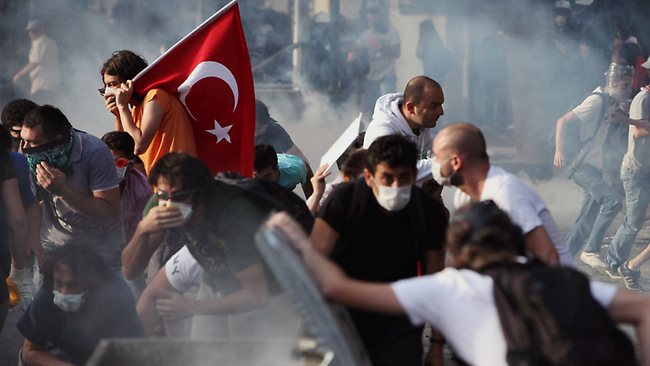
When I first saw the images from Taksim Square on Friday, I didn’t think much of it. Turkey has seen numerous protests for freedom of expression in the past few years, all of which were quickly suppressed with no noticeable consequences. As a Turkish-American who follows Turkey’s development very closely, I figured that this was another such event.
But by Saturday morning, it was clear that this time was different. And the energy of the protests only increased over the weekend. Here is the Reuters link describing the full situation.
The passionate protests are a culmination of years of frustration. Despite the many reasons given for the protests, I view them as most related to the severe restrictions on freedom of expression. International media frequently cites the statistic that Turkey has the most journalists in jail in the world. However, the changing nature of media freedom involves more than just journalists in jail. The level of self-censorship due to a culture of fear has significantly increased in Turkey over the past year. The protests this weekend were carried by almost no TV stations. That’s despite demonstrations in over 50 cities across the country. A TV blackout by any definition. Over the weekend a photo from inside Turkey went viral showing CNN International with live coverage of the protests while CNN Turkey ran a documentary on penguins.

No outlets for expression is only part of the problem, though.
The real issue has been the lack of checks and balances on the government. The AKP, the ruling Justice and Development Party, actually had a solid start, introducing a series of important structural reforms between 2002 and 2005. Two main outside influences helped to propel those reforms forward: 1) the ongoing EU membership talks; and 2) the IMF reform program following the collapse of the banking system in 2001.
In contrast, over the past 5 years, the AKP has consolidated its grip on power. EU membership is no longer a legitimate path for either side, the IMF program was completed, the army was severely weakened by trials of officers, the June 2011 elections saw a strong, sweeping win by the AKP, and media pressure has been limited as objecting journalists are pushed out over time.
All of those trends have led to an overconfident government, viewing any type of opposition as a weak nuisance, and pushing ahead with its agenda, full steam ahead. Just as an overconfident trader is more liable to make mistakes, so is an overconfident government. That overconfidence has led to an unfortunate short-sightedness.
The leaders of the AKP have frequently cited in the past few days that they are an elected government, acting out the will of the people. But its unchecked power has led the party astray, away from the consensus-building reforms of its first 5 years in power. The real reason for the protests is best summed up by a quote from Thomas Jefferson:
All, too, will bear in mind this sacred principle, that though the will of the majority is in all cases to prevail, that will to be rightful must be reasonable; that the minority possess their equal rights, which equal law must protect, and to violate would be oppression.
It’s in the best interests of both the government and its detractors that legitimate checks and balances exist in Turkey. As the protestors continue their outcry, restoring and strengthening such checks should be the path of resolution that all should be seeking.